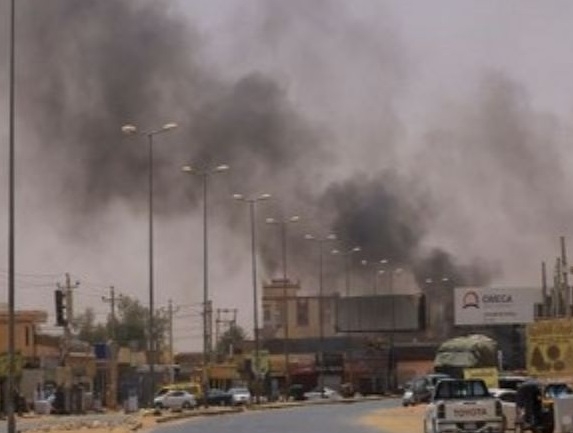
UAE has prioritised the sick, children, the elderly and women as the most vulnerable groups during the evacuations….reports Asian Lite News
The UAE has evacuated its citizens and nationals of a number of countries from war-ravaged Sudan on Tuesday.
Foreign Ministry said the UAE has also provided hosting and care services for 19 different nationalities during its evacuation operation to the city of Port Sudan, in preparation for facilitating departures. The evacuees will be hosted in the UAE before being transferred to their home countries.
The Ministry of Foreign Affairs and International Cooperation (MoFAIC) announced that in line with its commitments to humanitarian assistance and strengthening global cooperation and solidarity, the UAE has evacuated its citizens and nationals of a number of countries from Sudan, aligned with its humanitarian values based on providing protection for civilians, and extending assistance to countries in times of need.
In this regard, the UAE has prioritised the sick, children, the elderly and women as the most vulnerable groups during the evacuations.
The Ministry has expressed the UAE’s commitment to working with its partners and the international community to achieve the interests of the Sudanese people. Furthermore, the Ministry stressed the importance of intensifying efforts to secure a ceasefire and to return to the political process and dialogue to achieve progress in the transitional phase, in order to reach the desired political stability and security in Sudan.

Not ready for complete ceasefire
The top UN envoy for Sudan said the military leaders of the two warring parties in the north African country — Sudanese Armed Forces (SAF) and the Rapid Support Forces (RSF) — are not ready for a complete ceasefire.
“Both leaders have not been able to fully commit to a complete ceasefire or implement one. The two generals continue trading accusations and issuing competing claims of control over key installations,” said Volker Perthes, the Secretary-General’s special representative and head of the UN Integrated Transition Assistance Mission in Sudan.
The two military men at the centre of the violence that first erupted on April 15 are Gen Abdel Fattah al-Burhan, the head of the SAF and in effect the country’s president, and his deputy and leader of the RSF, Gen Mohamed Hamdan Dagalo, better known as Hemedti.
At least 459 people have died in this latest conflict so far, with more than 4,000 others injured.
There is yet no unequivocal sign that either is ready to seriously negotiate, suggesting that both think that securing a military victory over the other is possible, he said via a video link from Port Sudan on the Red Sea, where nearly 1,200 people, including 744 UN staff and their dependents, international NGO staff and diplomatic employees from several embassies, were relocated from Khartoum.
“This is a miscalculation. As fighting continues, law and order will further break down throughout the country, and command and control will dissipate. Sudan could become increasingly fragmented, which would have a devastating impact on the region,” he warned.
And even if one side wins, Sudan will lose, said Perthes.
A current 72-hour ceasefire, brokered by the US on Monday, seems to be holding in some parts of Sudan so far.
However, there have been reports of fighting and movement of troops, with the SAF and RSF accusing each other of violating the ceasefire.
In Khartoum, fighting around the Republican Palace, international airport, SAF headquarters, SF bases, and other strategic locations have largely continued or in some cases intensified.
Airstrikes and heavy shelling have also continued, particularly in Bahri and Omdurman on the outskirts of Khartoum.
Khartoum airport is reportedly now operational, but its aprons are damaged, the envoy said.
According to the envoy, residential areas near installations of the two military factions have come under persistent attacks.
“Homes, shops, schools, water and electricity installations, mosques, hospitals, and other health facilities have been damaged or destroyed. Reports of home invasions, looting of homes and shops and cars at checkpoints have been rampant.
“These have included the homes and cars of Sudanese citizens, UN staff, humanitarian workers, and the diplomatic community.
“We have also received disturbing reports of attempted sexual assaults. With supply lines running out and destroyed, fear of increased criminality is mounting. Reports of prisoners being released from detention centres across Khartoum have compounded these fears,” he added.
Perthes went on to add that the situation in western region of Darfur remains volatile and oher regions of Sudan, while spared from armed confrontation, are feeling the impact of the fighting.
Several are hosting thousands of internally displaced people, yet supply routes are disrupted, resulting in fuel shortages, he noted.
Throughout Sudan, significant price hikes of basic commodities are reported.
There are also increasing reports of armed robbers at checkpoints on some roads, looting civilians who are fleeing from violence, the envoy claimed.
The UN and partners are doubling their efforts to ensure that the 72-hour temporary ceasefire holds and evolves into a lasting cessation of hostilities and return to political negotiations, said Perthes.
ALSO READ: UAE: 2 Indian expats killed in accidents


